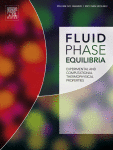|
Authors |
Abstract Polar soft-SAFT has been used in this work as a modeling tool to systematically assess the effect of impurities on the thermodynamic behavior of natural gas systems based on methane. The considered impurities include inert gasses (CO2, N2, CO), simple gasses (Ar, H2), sulfur-containing species (H2S, SO2, COS, methane- and ethane-thiols), and aromatic hydrocarbons (benzene, toluene, and xylenes). Polar soft-SAFT was first used to model the properties of pure compounds, including phase equilibria, speed of sound, Joule-Thomson effect, viscosity and interfacial tension. The predictive capability of the model for mixtures of the impurities with methane was assessed through comparison with available literature data, for different thermodynamic properties, obtaining excellent agreement in most of the cases, while an energy binary parameter was needed in few others. Additionally, the model's accuracy and robustness was further validated by accurately predicting the phase envelope of two multicomponent natural gas mixtures. The molecular models were subsequently used in a fully predictive manner to quantify the effect of the various impurities on density, speed of sound and viscosity of their binary mixtures with methane. It was established that the presence of hydrogen posed the largest decrease in density and viscosity of the gas, while increasing its speed of sound. Conversely, the presence of o-xylene resulted in the largest increase in both density and viscosity, while decreasing the speed of sound of the gas. These results demonstrate the effectiveness of soft-SAFT as a reliable tool for isolating and quantifying the effect of each individual impurity on the overall behavior of the systems, of clear implications for the industrial systems of interest. |
Altmetrics
|
|
Journal Fluid Phase Equilibria, 1 January 2021, v.527, 112841 |
||
|
Publication date 2021-01-01 |
||
|
DOI |



